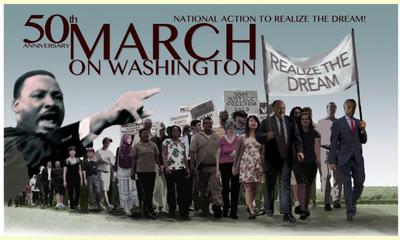|
|
Martin Luther King’s unfinished symphony of freedom
un article par Rev. Jesse L. Jackson, Sr., Rainbow Push Coalition (abridged)
Next weekend [August 24], we will celebrate the 50th
anniversary of the March on Washington for Jobs and
Freedom, best known for Dr. Martin Luther King’s
“Dream.”

click on photo to enlarge
[Editor's Note: Buses are being organized throughout
the United States to take people to the rally in
Washington. Click here for more information.
Fifty years later, the dream challenges us yet. It
is alive because it is not static. The dream of
equal rights and equal opportunity, of being
judged for character, not color, has transformed
this nation. Much progress has been forged; much
remains to be done.
One way to think about the Civil Rights Movement
and Dr. King’s Dream is as a symphony of freedom.
The first movement was the movement to end
slavery, which required the bloodiest war in
American history. Then came the drive to end
segregation, the disfiguring legal apartheid of
the South. In that victory, the movement freed not
only African-Americans but also the South to grow,
and opened access to libraries and hotels, trains
and restaurants, pools and parks. Rosa Parks could
sit wherever she wanted to on that bus.
The third movement was the movement for
empowerment, for the right to vote. That movement
culminated in the Voting Rights Act, challenging
the various taxes and tests and intimidation used
to deprive African-Americans of the power of the
ballot box. This year, the five conservatives on
the Supreme Court weakened the act. Conservative
governors are pushing to constrict rather than
expand the vote. We still have no constitutional
right to vote. Surely, that is the next step
toward the dream.
The fourth movement of the freedom symphony
features the trumpet call for equal opportunity .
. . Dr. King knew this final movement was the most
difficult. He saw Johnson’s war on poverty being
lost in the costly folly of Vietnam. He worried
that we might be “integrating into a burning
house.” He was murdered while standing with
sanitation workers organizing for dignity and a
decent wage. When he died, he was organizing a new
march on Washington — a Poor People’s Campaign
that would bring the impoverished of all races and
regions to a Resurrection City in Washington,
D.C., to demand a renewal of the war on poverty.
The fourth movement — the movement for real
equality of opportunity — remains unfinished. Its
agenda speaks to poor and working people of all
races: full employment, a living wage, child
nutrition, a good public education from pre-K to
affordable college, high-quality health care,
affordable housing in vibrant communities, workers
empowered to share in the profits and productivity
they help to produce. . .
The symphony of freedom is unfinished, but its
powerful themes still resound and stir its
listeners. Dr. King called on each of us to march
for justice. He understood the power of people of
conscience when they decide to act. As we remember
his dream, we are called to action, for there is
more work to be done.
Click here for more.
|








|
DISCUSSION
Question(s) liée(s) à cet article:
What's the message to us today from Martin Luther King, Jr.?,
* * * * *
Commentaire le plus récent:
I think Martin Luther King, Jr. would be happy that "drum majors for justice" are using the latest technologies to advance the cause of racial justice. The "just Democracy Blog" is a wonderful resource . One of the goals of the bloggers is to advance the national dialogue on racial justice. I recommend joing the Advancement Project mailing list.
justdemocracyblog

|
|









